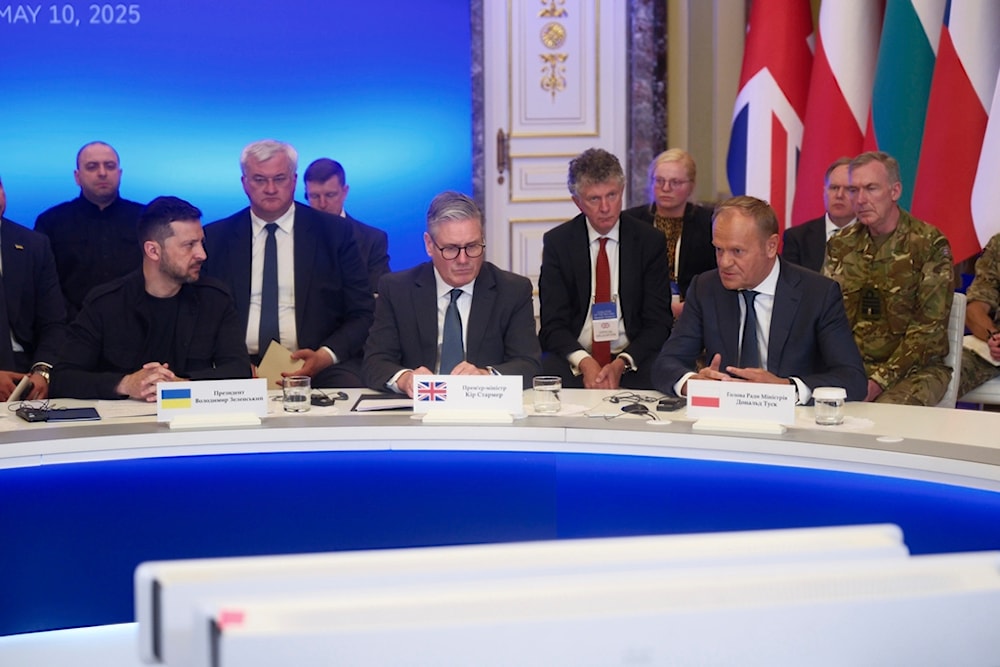Ukraine, allies back 30-day ceasefire from Monday if Russia agrees
Earlier in the day, Kremlin spokesperson Dmitry Peskov stated that any ceasefire would need to include a complete halt to US and European weapons deliveries to Ukraine.
-

From left, Ukrainian President Volodymyr Zelensky, Britain's Prime Minister Keir Starmer and Polish Prime Minister Donald Tusk speak during a meeting at the Mariinsky Palace in Kyiv, Ukraine, on Saturday, May 10, 2025 (AP Photo/Vitalii Nosach)
Ukrainian Foreign Minister Andrii Sybiha announced Saturday that Ukraine, along with a coalition of allied nations, is prepared to implement a 30-day, full and unconditional ceasefire starting Monday, pending Russia's agreement and the presence of credible international monitoring mechanisms.
"Ukraine and all allies are ready for a full unconditional ceasefire on land, air, and at sea for at least 30 days starting already on Monday. If Russia agrees and effective monitoring is ensured, a durable ceasefire and confidence-building measures can pave the way to peace negotiations," Sybiha posted on X.
The announcement followed a high-level summit in Kiev attended by key European leaders—French President Emmanuel Macron, German Chancellor Friedrich Merz, UK Prime Minister Keir Starmer, and Polish Prime Minister Donald Tusk—who later joined Ukrainian President Volodymyr Zelensky in a phone call with US President Donald Trump to discuss efforts toward de-escalation. NATO Secretary General Mark Rutte, along with over 20 global leaders, also voiced support for the truce. "This starts with a 30-day unconditional ceasefire and must be underpinned by continued, concrete support," Rutte said.
Ceasefire Conditions
However, Russia's response has been conditional. Kremlin spokesperson Dmitry Peskov stated that any ceasefire would need to include a complete halt to US and European weapons deliveries to Ukraine. "Otherwise it will be an advantage for Ukraine. Ukraine will continue their total mobilisation, bringing new troops to (the) frontline," he told ABC News. Peskov added that President Vladimir Putin supports a ceasefire "in principle" but emphasized that current Russian battlefield advances and the ongoing influx of Western arms undermine the viability of a pause in hostilities.
Peskov also reiterated longstanding Russian concerns about Ukraine's refusal to engage in direct talks—citing domestic laws barring negotiations with Moscow—and questioned the legitimacy of President Zelensky, whose term officially ended in May 2024. Former Russian President Dmitry Medvedev dismissed the ceasefire initiative in vulgar terms, reflecting hardline skepticism within the Kremlin.
Escalation Risk
In response to Moscow's hesitation, French President Emmanuel Macron warned that the European Union is prepared to impose tougher economic sanctions on Russia within days if it rejects the ceasefire. "If Russia does not commit to this 30-day ceasefire and these discussions, we must be able to impose additional sanctions that are much tougher on the Russian economy, even dissuasive in some way," Macron said in an interview with TF1 and LCI.
Trump, for his part, reiterated his call for an end to the war, urging both sides to "get this stupid war finished." He warned that failure to comply with the ceasefire could result in further US and allied sanctions against both Russia and Ukraine. His comments come amid growing frustration in Washington over what some officials view as Moscow's stalling.
Read more: Russia asking for too much in Ukraine ceasefire talks: JD Vance
Meanwhile, active combat has continued. Since Sybiha's announcement, Russian forces have launched additional drone and missile strikes along the 1,600-kilometer front, killing at least 117 civilians and injuring over 1,000 in the past two months, according to the Associated Press. Although Russia had declared brief truces for Orthodox Easter and Victory Day, it claims Ukraine violated both, logging nearly 14,000 breaches in total.

 3 Min Read
3 Min Read









